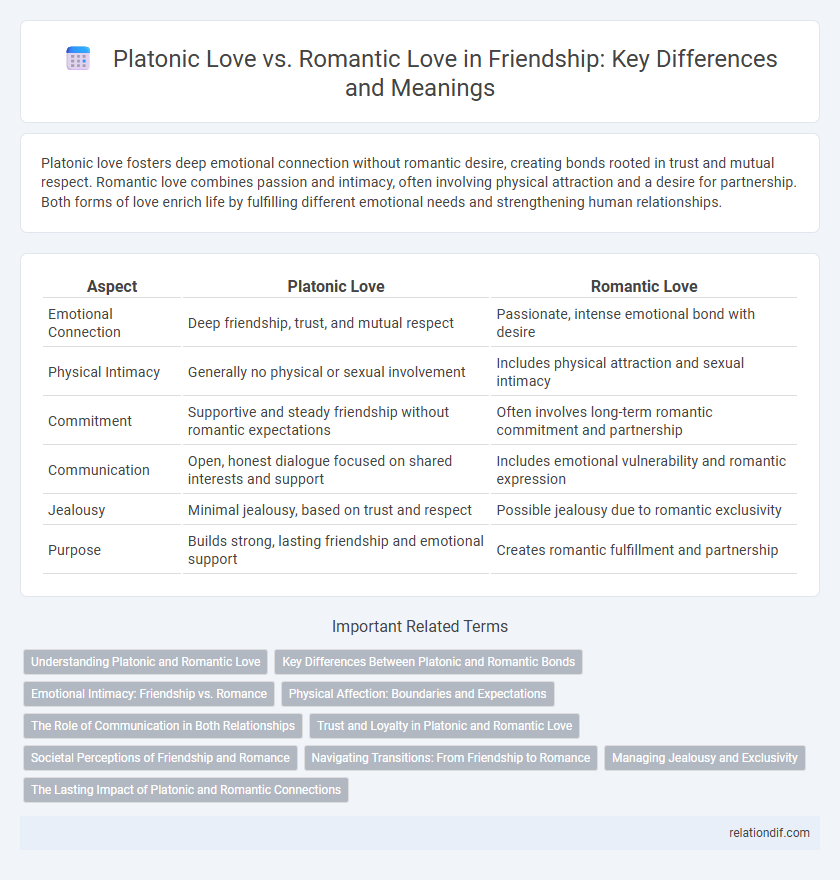Platonic love fosters deep emotional connection without romantic desire, creating bonds rooted in trust and mutual respect. Romantic love combines passion and intimacy, often involving physical attraction and a desire for partnership. Both forms of love enrich life by fulfilling different emotional needs and strengthening human relationships.
Table of Comparison
| Aspect | Platonic Love | Romantic Love |
|---|---|---|
| Emotional Connection | Deep friendship, trust, and mutual respect | Passionate, intense emotional bond with desire |
| Physical Intimacy | Generally no physical or sexual involvement | Includes physical attraction and sexual intimacy |
| Commitment | Supportive and steady friendship without romantic expectations | Often involves long-term romantic commitment and partnership |
| Communication | Open, honest dialogue focused on shared interests and support | Includes emotional vulnerability and romantic expression |
| Jealousy | Minimal jealousy, based on trust and respect | Possible jealousy due to romantic exclusivity |
| Purpose | Builds strong, lasting friendship and emotional support | Creates romantic fulfillment and partnership |
Understanding Platonic and Romantic Love
Platonic love emphasizes deep emotional connections without sexual attraction, fostering trust and mutual respect that strengthen long-term friendships. Romantic love involves passionate desire and intimacy, combining emotional closeness with physical affection to build intimate partnerships. Understanding these distinctions helps individuals navigate relationships with clarity and emotional fulfillment.
Key Differences Between Platonic and Romantic Bonds
Platonic love centers on deep emotional connection and mutual respect without sexual attraction, fostering companionship and unconditional support. Romantic love involves passion, intimacy, and often physical desire, combining emotional closeness with romantic involvement. Key differences include the presence of romantic desire, expectations of exclusivity, and physical intimacy, which are typically absent in platonic relationships.
Emotional Intimacy: Friendship vs. Romance
Emotional intimacy in friendship centers on deep trust, mutual understanding, and unwavering support without romantic expectations, fostering a safe space for vulnerability and authenticity. Romantic love adds layers of passion and physical closeness, blending emotional connection with desire and shared life goals, intensifying the bond. Both forms of intimacy contribute to human well-being but serve distinct roles in emotional fulfillment and interpersonal dynamics.
Physical Affection: Boundaries and Expectations
Platonic love values physical affection that respects clear boundaries, often expressed through gestures like hugs or pats on the back without romantic intent. Romantic love typically involves a higher level of physical intimacy, including holding hands, kissing, or other touch that conveys deeper emotional connection. Understanding and communicating these differing expectations helps maintain trust and comfort within both types of relationships.
The Role of Communication in Both Relationships
Effective communication serves as the foundation for both platonic and romantic love, fostering trust and mutual understanding. In platonic relationships, open dialogue helps maintain emotional support and respect without romantic expectations, while in romantic relationships, communication navigates intimacy and conflict resolution. Active listening and honest expression strengthen bonds, ensuring clarity of intentions and emotional needs across both types of love.
Trust and Loyalty in Platonic and Romantic Love
Trust and loyalty form the foundation of both platonic and romantic love, but their expressions differ significantly. In platonic relationships, trust often revolves around emotional support and shared values without the complexities of physical intimacy, fostering unwavering loyalty through companionship and mutual respect. Romantic love intertwines trust with vulnerability and physical closeness, where loyalty is tested by deeper emotional bonds and commitment challenges unique to romantic partnerships.
Societal Perceptions of Friendship and Romance
Societal perceptions often elevate romantic love as the pinnacle of emotional connection, overshadowing the value of platonic love in friendships. Cultural narratives tend to associate romance with fulfillment and legitimacy, while friendships are sometimes viewed as secondary or less intense bonds. This bias influences how individuals prioritize relationships, despite evidence that platonic love can provide equally profound support and emotional intimacy.
Navigating Transitions: From Friendship to Romance
Navigating transitions from friendship to romance requires clear communication and mutual understanding of evolving emotions to maintain trust and respect. Recognizing the nuances between platonic love's stability and romantic love's passion helps manage expectations and potential changes in the relationship dynamic. Couples who successfully shift from friendship to romance often prioritize emotional honesty and empathy to preserve the foundational bond.
Managing Jealousy and Exclusivity
Platonic love fosters trust and open communication, which helps manage jealousy by emphasizing emotional support without romantic expectations. Romantic love often involves exclusivity, intensifying jealousy when boundaries feel threatened or unclear. Establishing clear expectations in both friendships and romantic relationships reduces misunderstandings and promotes healthy emotional connections.
The Lasting Impact of Platonic and Romantic Connections
Platonic love fosters deep emotional support and long-term trust, creating bonds that often endure life's changes without requiring physical intimacy. Romantic love intertwines passion and intimacy, producing intense emotional experiences but sometimes fluctuating due to external pressures or changing desires. Both connections significantly shape individual well-being and personal growth, influencing social networks and emotional resilience throughout life.
platonic love vs romantic love Infographic

 relationdif.com
relationdif.com